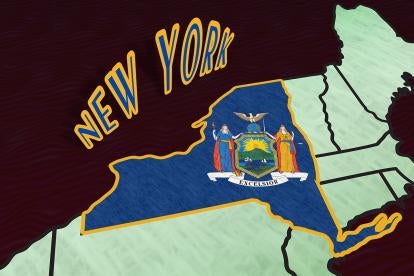On May 6, 2023, the New York State Senate passed Senate Bill S6636, now Assembly Bill A6698.1 This bill proposes sweeping changes to New York’s wrongful death statute, which has been in place since 1847. Known as the Grieving Families Act, the bill was reintroduced into the New York State Legislature following Governor Hochul’s January 30, 2023, veto over concerns owing to unknown costs and the definitions of a close family member, the nature of damages and the expansion of the statute of limitations.2
In vetoing the initial Grieving Families Act, Governor Hochul explained her concerns in an op-ed published by the New York Daily News, writing that the legislation was missing “a serious evaluation of the impact of these massive changes on the economy, small businesses, individuals, and the state’s complex healthcare system."3
Provisions of A6698
The Grieving Families Act would take effect immediately upon passage and “shall apply to all causes of action that accrue on or after July 1, 2018, regardless of when filed.” This means that it would apply to any matter involving a decedent who died on or after July 1, 2018.
The current bill (A6698):
- Extends the statute of limitations from two years to three years from the date of the decedent’s death.
- Allows recovery for “grief or anguish caused by the decedent’s death” in addition to the existing damages.
- Allows a jury to determine who comprises the decedent’s “close family member” entitled to damages “based on the specific circumstances relating to the person’s relationship with the decedent.”
- Defines “surviving close family members” as decedent’s spouse or domestic partner, issue, foster-children, step-children, and step-grandchildren, parents, grandparents, step-parents, step-grandparents, siblings, or any person standing in loco parentis to the decedent for the purpose of distributing damages.
Analysis
If signed into law, this legislation will significantly impact health care providers including hospitals, skilled nursing facilities, doctors, nursing professionals and therapists, as well as the medical professional insurance industry, the courts and attorneys. Importantly, there has been no “serious evaluation of the impact of these massive changes” as the governor requested.
This bill is a slight improvement over the prior bill as it narrows the pool of wrongful death plaintiffs to spouses or domestic partners, children, foster children, step-children, step-grandchildren, parents, grandparents, step-parents, step-grandparents, siblings or anyone acting in loco parentis to the decedent.
While the new legislation removed the provision for additional damages for “disorders caused by such grief or anguish,” it still allows the recovery of highly subjective damages for “grief and anguish” of close family members. Unlike the newly limited pool of potential plaintiffs, the current bill allows the identity of those “close family members” and the value of their “grief and anguish” to be left to a jury to decide. Currently, damages for wrongful death are fairly objective economic and pecuniary damages, medical bills and funeral costs, with an allowance for loss of parental guidance. This new bill will likely create a wide range of awards with subjective valuations premised on emotional pleas rather than rational facts and arguments.
Any legislation expanding damages in a wrongful death action should be weighed against New York’s lack of a cap on Medical Malpractice damage awards and Article I, § 164 of the New York Constitution: "The right of action now existing to recover damages for injuries resulting in death, shall never be abrogated; and the amount recoverable shall not be subject to any statutory limitation." So once the list of individuals who may claim damages and the nature of damages is expanded, it is unconstitutional in New York to cap those awards. This extended statute of limitations from two to three years will create uncertainty in the insurance market, and lead to higher costs to health care providers for insurance and record keeping.
As an immediate concern, as a result of this bill, discovery would retroactively capture any wrongful death from July 1, 2018, to the present, whether or not they are yet filed. This means that insurance coverage, with premiums calculated based on the current law, would be affected by potential new actions and any reserves set on existing claims would be affected. This law may potentially result in coverage disputes among the insured, the carriers and excess carriers.
In addition to steeper insurance premiums, health care providers face inflation, increased wages due to rising minimum wage levels, COVID-19 litigation (exacerbated insurance coverage issues), and concerns about Medicaid, Medicare and private insurance payments. In addition, skilled nursing facilities face increased regulation and higher required levels of staffing.5 The ability to sustain these additional costs will vary by facility, but the impact of this bill will likely affect fiscal decisions for most health care providers, impact planned expansion or improvement of existing facilities, and potentially result in closure of adversely affected facilities.
For pending and future litigation, this bill would expand discovery requirements and require longer depositions with increased focus on issues such as who visited patients in various health care facilities. Any death notifications and the perceived emotional state of family members may be a topic during already lengthy depositions.
The medical malpractice and nursing home defense bar will require additional discovery, including depositions of potential “close family members” to prevent unfair surprise at trial. This may lead to a flurry of motions to strike the Note of Issue or additional court conferences to address additional discovery. The court and both the plaintiffs’ and defense bars are already straining under the weight of clearing the existing litigation delayed by the COVID-19 pandemic and the swell of COVID-19 cases, so this additional discovery will require more personnel hours resulting in higher defense costs.
This additional discovery also could lead to delays in resolution and crowded court dockets for the foreseeable future. Each facet of trial will need to adjust to this new area of damages, from jury selection to jury charges. Defense attorneys will need to focus increasingly on potential jurors’ susceptibility to emotional persuasion.
In sum, Governor Hochul was correct in recognizing the “massive changes” contemplated by changing New York’s Wrongful Death statute, which likely will result in uncertainty and higher costs.
Wilson Elser will closely monitor Governor Hochul’s response to Assembly Bill A6698 once it is delivered to her office.
1 https://www.nysenate.gov/legislation/bills/2023/a6698
2 https://www.nysenate.gov/legislation/bills/2021/S74
3 https://www.nydailynews.com/opinion/ny-oped-lets-agree-on-helping-grieving-families-today-before-midnight-deadline-20230130-jim7ltxwofdm3nwurnidmi6mvi-story.html; https://www.nytimes.com/2023/01/31/nyregion/hochul-wrongful-death-bill-veto.html
4 Formerly Article I, § 18.
5 https://regs.health.ny.gov/content/section-41513-nursing-services



 i
i


